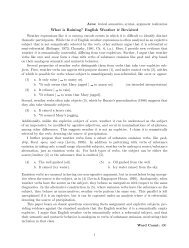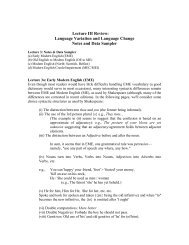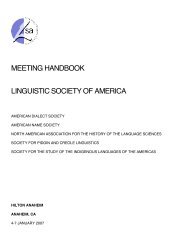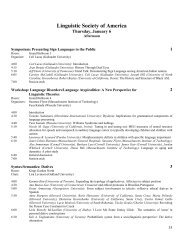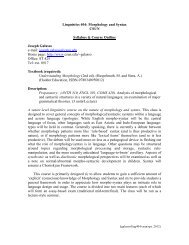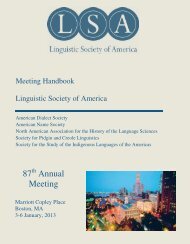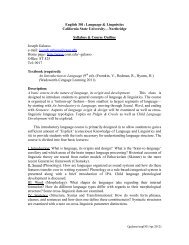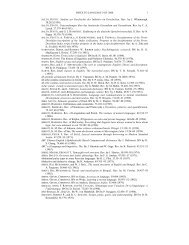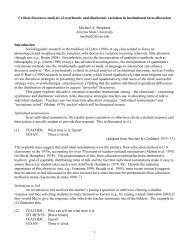here - Linguistic Society of America
here - Linguistic Society of America
here - Linguistic Society of America
Create successful ePaper yourself
Turn your PDF publications into a flip-book with our unique Google optimized e-Paper software.
Rosa Vallejos (University <strong>of</strong> New Mexico) Session 99Rosa Amías (FORMABIAP)Documenting for revitalization: working with the Kokamas from the AmazonToon Van Hal (University <strong>of</strong> Leuven) Session 75Génie de la langue, from Augustine to Whorf? On the roots <strong>of</strong> an influential notion and on its vicissitudes in scholarly learningthroughout centuriesScholars writing on language(s) during the 18th century were obsessed with the génie de la langue. This rather vague, but veryinfluential concept highlighted the distinctiveness <strong>of</strong> an individual language in comparison to others. As such, it has been <strong>of</strong>paramount importance in national(ist) discourse. In spite <strong>of</strong> recent historiographical attention given to the vicissitudes <strong>of</strong> this idea,its very origin has remained underexposed. This paper aims at revealing the more remote history <strong>of</strong> the notion génie de la langue.Its main focus is on Early Christian Latin texts as well as Early Modern Neo-Latin texts <strong>of</strong> the late-sixteenth and earlyseventeenthcenturies.Stephanie Villard (University <strong>of</strong> Texas at Austin) Session 99John Ryan Sullivant (University <strong>of</strong> Texas at Austin)¿Por qué no das clases de inglés? Obstacles to language revitalization in two Chatino communitiesWhile t<strong>here</strong> is an overall positive sentiment associated with Chatino identity and language, for two Chatino-speaking communitiest<strong>here</strong> has been much less support for community-wide revitalization efforts than would be expected. Our hypothesis is that inaddition to other factors in play—such as the absence <strong>of</strong> the high degrees <strong>of</strong> multilingualism found in other Latin <strong>America</strong>nregions such as Amazonia and the shift from a linguistic identity to a cultural identity—the community's exposure to andparticipation in cyclical migration to the United States has brought about favoritism towards English, which depresses motivationfor Chatino language revitalization efforts.Marine Vuillermet (University <strong>of</strong> California, Berkeley) Session 100Verb compounding in Ese Ejja: sit-go.in and listen-well!Ese Ejja (Takana) is an Amazonian language spoken in Peru and Bolivia. In (1), the single predicate consists <strong>of</strong> two verbs (pojo-‘divide’ and jaja- ‘cut’), which can also appear separately.(1) Mei=pa [jaja-pojo]-ka-ani-naje.stone=REP cut-divide-3A-HAB-PAS‘they used to cut stones into pieces.’Verb compounding may consist <strong>of</strong> two verb roots, but it is also productive with (a verb and) an adjective. The characteristics <strong>of</strong>the compounding process to be considered are their: basic semantics <strong>of</strong> cause-result; valency harmony within verb-verb compounds; argument structure within verb-adjective compounds; reduplication (with an antipassive function), which only involves one element.Abby Walker (The Ohio State University) Session 17Christina García (The Ohio State University)Yomi Cortés (University <strong>of</strong> Puerto Rico at Mayagüez)Kathryn Campbell-Kibler (The Ohio State University)The global and local meanings <strong>of</strong> /s/ to Puerto Rican listenersIn this study we investigate how the social evaluation <strong>of</strong> pre-consonantal /s/ in Spanish interacts with the speakers’ region,comparing two regional dialects known to differ in the predominant realization <strong>of</strong> /s/: Puerto Rican Spanish (aspirated) andMexican Spanish (sibilant). Both /s/ variants were spliced into the recorded speech <strong>of</strong> 7 Mexican and Puerto Rican males, and 62Puerto Rican listeners then rated the speakers on social dimensions. The results suggest that when listeners process the socialmeaning <strong>of</strong> a variable they take the variable’s regional status into account, but that t<strong>here</strong> are some global associations <strong>of</strong> thevariants.213



